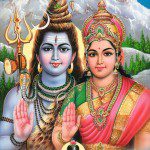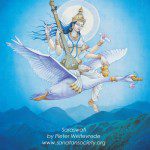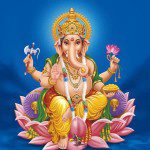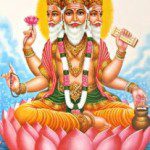Shiva (pronounced Sheeva or Sheewa) is a very important God in modern Hinduism. He is one of the three Gods of the Hindu trinity, who represent Creation, Preservation, and Destruction. Shiva is the destroyer. Not only the destroyer of creation when the time comes, but also the destroyer of ignorance and the destroyer of misery. There is an entire branch of Hinduism who puts Shiva as the One True God (Shivites/Shivaism).
Why Worship Shiva * Stories * Symbolism * Holidays * How He Is Worshiped * Mantras and Bhajans
Why Worship Shiva?
It is he who destroys what is no longer good or needed in order to pave the way for rebirth. He can destroy bad karma when you are devoted to him and he can grant you long life. He crushes ignorance beneath his feet and loves his devotees so much that he has granted blessings to people who worshiped him without realizing it. He is both a family man and one who meditates. Parvati is his wife and Ganesha is his son. He is the one that women pray to for good husbands and the one they thank when they have a good husband.
Stories
There are a number of classic stories told about Shiva.
Churning the Ocean, or Why Shiva’s Neck Turned Blue
There are two factions: devas, who are angelic-type beings and asuras, who are demon-like beings. The two groups are often fighting one another. But when they found out that there was a nectar of immortality (amrita) in the ocean, they formed an alliance to find and share it. In order to obtain this nectar, it had to be churned from the ocean. The devas were on one side and the asuras on the other, using a mountain to churn into the ocean and a great snake wrapped around it to move the mountain.  However, before they reached the amrita, other things emerged from the milky ocean. One of these things was a powerful poison that could destroy the world. Shiva ran in and swallowed the poison before it could harm anyone. His wife, Parvati, was close behind and she grabbed hold of his neck to keep him from swallowing. And so Shiva held the poison in his throat, causing it to turn blue. He is often known as the blue-throated one. (The devas and asuras did eventually get to the amrita and then broke their alliance and fought viciously over which side would get it. Vishnu intervened and saw to it that it was the devas who drank). There’s a lot more detail and symbolism to this story, but the part with the poison is the part relevant to Shiva. Read more about it here.
However, before they reached the amrita, other things emerged from the milky ocean. One of these things was a powerful poison that could destroy the world. Shiva ran in and swallowed the poison before it could harm anyone. His wife, Parvati, was close behind and she grabbed hold of his neck to keep him from swallowing. And so Shiva held the poison in his throat, causing it to turn blue. He is often known as the blue-throated one. (The devas and asuras did eventually get to the amrita and then broke their alliance and fought viciously over which side would get it. Vishnu intervened and saw to it that it was the devas who drank). There’s a lot more detail and symbolism to this story, but the part with the poison is the part relevant to Shiva. Read more about it here.
Shiva, Lord of the Dance
Apasmara Purusha is a demon of ignorance, laziness, jealousy, ego, and hatred. He used to trouble mankind until people prayed to Shiva, who descended and performed a divine dance called Ananda Tandava (dance of joy), crushing the demon beneath his feet. In this dancing form, Shiva is called King of the Dance: Nataraja. Classical Indian dances are based on his cosmic dance of destruction and rebirth.
The River Ganga (Ganges) and Shiva’s Matted Hair
It used to be that the Ganges river (actually named Ganga) flowed in the heavens. There was a king who was cursed with no offspring and he felt he needed to wash away the sins of his forefathers and cleanse his kingdom with the Ganga. So he prayed that she might come to earth. Ganga wanted to, but she was so powerful that if she flowed down to earth, she would crush it with the force of her waters. And so Shiva stepped in and allowed the Ganga to flow through his hair (usually depicted to be in dreadlocks) so soften her decent to earth.
How Shiva Married Parvati
Parvati is an incarnation of Shakti, feminine energy. She was born to draw Shiva out of his meditative asceticism and bring him back to caring for the world. A powerful demon was torturing humanity and devas alike. No one could defeat him except, it was said, Shiva’s child. But Shiva’s wife Sati had died and he was meditating alone in a cave, not interested in coming back into the world. People prayed to the great Goddess (Mahadevi) and she incarnated herself in Parvati, born to the king of the Himalayan mountains.
When she grew up, Parvati went to Shiva to make him fall in love with her and marry her, but he would not even open his eyes or respond to her at all. She tried everything she could think of: decorating his cave, bringing him flowers and sweets, even getting Kama (God of desire) to shoot Shiva with arrows of lust. Shiva was so annoyed that he opened his third eye and reduced Kama to ash.
The Gods were very worried that now men would no longer desire women and the human race would fall apart. Parvati determined that Kama could be reborn as their child if she could just get Shiva to love her.
So she took a different tac and began meditation and austerities as well. She lived in the forest and did not eat or shield herself with clothing. The ascetics of the forest were very impressed with her. After some time, Shiva was impressed as well. He stopped his meditating and emerged from the cave to marry her. She reawakened in him his care for the world. Shiva was able to become a perfect blend of family man and hermit.
The Hunter and The Tiger
There was a hunter in the forest once who encountered a tiger who was too much for him. He ran from the tiger and climbed high up into a tree. The tiger remained below, pacing, and the hunter was trapped. He stayed in the tree all night and in order to stay awake, he plucked its leaves and let them drift to the ground. Little did he know that there was a Shiva Lingam beneath the tree also and the tree was a betel leaf tree, which is beloved to Shiva. So all night the hunter was letting betel leaves drop onto the Shivaling. In the morning the tiger was gone, replaced by Shiva himself, who blessed the hunter.
Many more great Hindu stories at http://hindumythologyforgennext.blogspot.com
Symbolism
Five is an important number to Shiva. According to some legends, he has five faces.
Nandi the bull is Shiva’s vehicle/mount. Each God has an animal companion and Nandi is Shiva’s. More info on Nandi here.
Holidays
There is one night of the year which is said to be Shiva’s favorite and there is a festival dedicated to him called Maha Shivratri (which literally means Shiva’s Great Night). Because Shiva is a God of meditation, austerity, and contemplation, this festival is much less about frolicking than many others. This is a night for dedication and discipline. It is traditional to fast during the day and then stay up all night praying to Shiva.
- Some say that the origin of this holiday is from when Shiva drank the poison that was churned out of the ocean and we give thanks for that pain by celebrating him and pouring water over the lingam form of Shiva to soothe him.
- Some say that it is the anniversary of the night that Shiva danced the tandava dance dispelling ignorance.
- Some say it is the anniversary of Shiva’s marriage to Parvati.
How He Is Worshipped
Though Shiva can be worshiped every day, Monday is considered particularly connected to him. Some Shivites fast on Mondays (and young girls are often encouraged to fast for Shiva on Mondays as a way to ask for a good husband).
Lingam
 Worshiping Shiva in this form allows us to connect with him as a formless being with neither beginning nor end. Its phallic shape represents life, energy, and progeny. It is said that this is the best way to worship Shiva in the current age (the Kali Yuga). To do a Shiva linga puja at home you will need:
Worshiping Shiva in this form allows us to connect with him as a formless being with neither beginning nor end. Its phallic shape represents life, energy, and progeny. It is said that this is the best way to worship Shiva in the current age (the Kali Yuga). To do a Shiva linga puja at home you will need:
- a bell or conch shell (and know how to blow the shell to produce a sound)
- Any five of the following liquids: water from the Ganges, Honey, Sugarcane Juice, Cow’s Milk, Yogurt, Ghee, Seawater, Coconut Water, Fragrant Oils, Rose Water.
- (optional) A set of japa mala beads to count mantras on
- Sandalwood paste
- Fresh Flowers
- Fruits and/or sweets
- Incense (or camphor)
- a lamp or candle on a tray
- Vibhuti (white ash)
Before beginning, wash yourself and dress in clean clothes. Sit in front of the lingam and either ring the bell or blow the conch shell to indicate the puja is beginning (it is said to awaken or alert the God). Five liquids are poured over the lingam (panchamrit abhishek). Take your five liquids and pour them one by one over the lingam while chanting Om Namah Shiv-i-ya. Use your beads to count repeating this mantra 108 times. Clean the lingam with water (if possible, water from the Ganges). Smear sandalwood paste on the lingam and wrap flowers around it. While rubbing on the paste, chant: “Om Umaamaheshwaraabhyaam Namah Karodwartnaarthem Chandanam Samarpayaami.” Along with the flowers you can also offer betel leaves, which are particularly beloved of Shiva. (The water and sandalwood paste are for keeping Lord Shiva cool, as he is passionate and hot tempered. In some temples you will see liquid constantly dropping onto the lingam from a pot. This is also meant to keep Shiva cool.) Offer the sweets and/or fruits by placing them in front of the lingam and leaving them there while you light incense and conduct aarti by moving a light lamp on a tray in clockwise circles in front of the lingam. Ring the bell or blow the conch again to indicate the end of the puja. Put vibhuti on your forehead (and distribute to anyone else present). Also distribute the fruits and sweets as prasadam (blessed food) to be eaten by devotees.
Mantras and Bhajans
Om Namah Shiviya is a very popular short mantra to recite. It can be found in numerous places, such as on bracelets. Here’s the Sanskrit: ॐ नमः शिवाय I bet you’ll start seeing it all over the place!
Shiva Chalisa is a prayer to be recited with sincerity and devotion. It is said to remove obstacles and hardship from a devotee’s life. Here is the text and a translation from http://www.mahashivratri.org/shiva-chalisa.html
| Lord Shiv Chalisa | English Translation |
| Jai Ganesh Girija Suvan Mangal Mul Sujan Kahat Ayodhya Das Tum Dev Abhaya Varadan |
Glory to Lord Ganesh, the Divine Son of Goddess Girija, the cause of all auspiciousness and intelligence. Ayodha Dass (the composer of these verses) humbly requests that every one be blessed with the boon of being fearless. |
| Jai Girija Pati Dinadayala Sada Karat Santan Pratipala Bhala Chandrama Sohat Nike Kanan Kundal Nagaphani Ke |
O Glorious Lord, consort of Parvati You are most merciful. You always bless the poor and pious devotees. Your beautiful form is adorned with the moon on Your forehead and on your ears are earrings of snakes’ hood. |
| Anga Gaur Shira Ganga Bahaye Mundamala Tan Chhara Lagaye Vastra Khala Baghambar Sohain Chhavi Ko Dekha Naga Muni Mohain |
The holy Ganges flows from your matted hair. The saints and sages are attracted by Your splendid appearance. Around Your neck is a garland of skulls. White ash beautifies Your Divine form and clothing of lion’s skin adorns Your body. |
| Maina Matu Ki Havai Dulari Vama Anga Sohat Chhavi Nyari Kara Trishul Sohat Chhavi Bhari Karat Sada Shatrun Chhayakari |
O Lord, the beloved daughter of Maina on Your left adds to Your splendid appearance. O Wearer of the lion’s skin, the trishul in Your hand destroys all enemies. |
| Nandi Ganesh Sohain Tahan Kaise Sagar Madhya Kamal Hain Jaise Kartik Shyam Aur Ganara-U Ya Chhavi Ko Kahi Jata Na Kauo |
Nandi and Shri Ganesh along with Lord Shiva appear as beautiful as two lotuses in the middle of an ocean. Poets and philosophers cannot describe the wonderful appearance of Lord Kartikeya and the dark complexioned Ganas (attendants). |
| Devan Jabahi Jaya Pukara Tabahi Dukha Prabhu Apa Nivara Kiya Upadrav Tarak Bhari Devan Sab Mili Tumahi Juhari |
O Lord, whenever the Deities humbly sought Your assistance, You kindly and graciously uprooted all their problems. You blessed the Deities with Your generous help when the demon Tarak outraged them and You destroyed him. |
| Turata Shadanana Apa Pathayau Lava-Ni-Mesh Mahan Mari Girayau Apa Jalandhara Asura Sanhara Suyash Tumhara Vidit Sansara |
O Lord, You sent Shadanan without delay and thus destroyed the evil ones Lava and Nimesh. You also destroyed the demon Jalandhara. Your renown is known throughout the world. |
| Tripurasur Sana Yudha Machayi Sabhi Kripakar Lina Bachayi Kiya Tapahin Bhagiratha Bhari Purva Pratigya Tasu Purari |
O Lord, Purari, You saved all Deities and mankind by defeating and destroying the demons Tripurasura. You blessed Your devotee Bhagirath and he was able to accomplish his vow after rigorous penance. |
| Danin Mahan Tum Sama Kou Nahin Sevak Astuti Karat Sadahin Veda Nam Mahima Tab Gayaee Akatha Anandi Bhed Nahin Payee |
O Gracious One, devotees always sings Your glory. Even the Vedas are unable to describe Your greatness. No one is as generous as You are. |
| Pragate Udadhi Mantan Men Jvala Jarat Sura-Sur Bhaye Vihala Kinha Daya Tahan Kari Sahayee Nilakantha Tab Nam Kahayee |
Lord, when the ocean was churned and the deadly poison emerged, out of Your deep compassion for all, You drank the poison and saved the world from destruction. Your throat became blue, thus You are known as Nilakantha. |
| Pujan Ramchandra Jab Kinha Jiti Ke Lanka Vibhishan Dinhi Sahas Kamal Men Ho Rahe Dhari Kinha Pariksha Tabahin Purari |
When Lord Rama worshipped You, He became victorious over the king of demons, Ravana. When Lord Rama wished to worship Thee with one thousand lotus flowers, the Divine Mother, to test the devotion of Shri Ram, hid all the flowers at Your request. |
| Ek Kamal Prabhu Rakheu Joi Kushal-Nain Pujan Chaha Soi Kathin Bhakti Dekhi Prabhu Shankar Bhaye Prasanna Diye-Ichchhit Var |
O Lord, You kept on looking at Shri Ram, who wished to offer His lotus-like eyes to worship Thee. When You observed such intense devotion, You were delighted and blessed Him. You granted His heart’s desire. |
| Jai Jai Jai Anant Avinashi Karat Kripa Sabake Ghat Vasi Dushta Sakal Nit Mohin Satavai Bhramat Rahe Mohin Chain Na Avai |
Glory be unto You O Gracious, Infinite, Immortal, All-pervading Lord. Evil thought torture me and I keep on travelling aimlessly in this world of mundane existence. No relief seems to be coming my way. |
| Trahi-Trahi Main Nath Pukaro Yahi Avasar Mohi Ana Ubaro Lai Trishul Shatrun Ko Maro Sankat Se Mohin Ana Ubaro |
O Lord! I beseech Your help and seek your divine blessing at this very moment. Save and protect me. Destroy my enemies with Your Trishul. Release me from the torture of evil thoughts. |
| Mata Pita Bhrata Sab Hoi Sankat Men Puchhat Nahin Koi Svami Ek Hai Asha Tumhari Ava Harahu Aba Sankat Bhari |
O Lord, when I am in distress, neither my parents, brothers, sisters nor loved ones can relieve my suffering. I depend only on You. You are my hope. Eliminate the cause of this tremendous torture and bless me with Your compassion. |
| Dhan Nirdhan Ko Deta Sadahin Jo Koi Janche So Phal Pahin Astuti Kehi Vidhi Karai Tumhari Kshamahu Nath Aba Chuka Hamari |
O Lord, You bless the downtrodden with prosperity and grant wisdom to the ignorant. Lord, due to my limited knowledge, I omitted to worship Thee. Please forgive me and shower Your grace upon me. |
| Shankar Ho Sankat Ke Nishan Vighna Vinashan Mangal Karan Yogi Yati Muni Dhyan Lagavan Sharad Narad Shisha Navavain |
O Lord Sankar, You are the destroyer of all miseries. You remove the cause of all obstacles and grant Your devotees eternal bliss. The saints and sages meditate upon Thy most beautiful form. Even celestial beings like Sharad and Narad bow in reverence to You. |
| Namo Namo Jai Namah Shivaya Sura Brahmadik Par Na Paya Jo Yah Patha Karai Man Lai Tapar Hota Hai Shambhu Sahayee |
O Lord, prostration to You. Even Brahma is unable to describe Thy greatness. Whosoever recites these verses with faith and devotion receives Your infinite blessings. |
| Riniyan Jo Koi Ho Adhikari Patha Karai So Pavan Hari Putra-hin Ichchha Kar Koi Nischaya Shiva Prasad Tehin Hoi |
Devotees who chant these verses with intense love become prosperous by the grace of Lord Shiva. Even the childless wishing to have children, have their desires fulfilled after partaking of Shiva-prasad with faith and devotion. |
| Pandit Trayodashi Ko Lavai Dhyan-Purvak Homa Karavai Trayodashi Vrat Kare Hamesha Tan Nahin Take Rahe Kalesha |
On Trayodashi (13th day of the dark and bright fortnights) one should invite a pandit and devotedly make offerings to Lord Shiva. Those who fast and pray to Lord Shiva on Trayodashi are always healthy and prosperous. |
| Dhupa Dipa Naivedya Charhavai Anta Vasa Shivapur Men Pavai Kahai Ayodhya Asha Tumhari Jani Sakal Dukha Harahu Hamari |
Whosoever offers incense, prasad and performs arti to Lord Shiva, with love and devotion, enjoys material happiness and spiritual bliss in this world and hereafter ascends to the abode of Lord Shiva. The poet prays that Lord Shiva removed the suffering of all and grants them eternal bliss. |
| Nitya Nema kari Pratahi Patha karau Chalis Tum Meri Man Kamana Purna Karahu JagadishOm Shivaya Namaa |
O Universal Lord, every morning as a rule I recite this Chalisa with devotion. Please bless me so that I may be able to accomplish my material and spiritual desires.Om Shivaya Namaa |
http://www.youtube.com/watch?v=qm5lQs2fBGU
MAHA MRITYUNJAYA MANTRA
Aum Trayambakam Yajamahe Sugandhim Pushtivardhanam Urva Rukamiva Bandhanaan Mrityor Mokshiye Maamritat.
We worship Shiva – The Three-Eyed (tryambakam) Lord (yajamahe); Who is fragrant (sugandhim) and nourishes (pushti) and grows (vardhanam) all beings. As the ripened cucumbe (urvarukamiva) is liberated (bandhanaan) from its bondage to the creeper when fully ripens; May He liberate us (mokshiya) from death (mrityor), for the sake of immortality (maamritaat).














